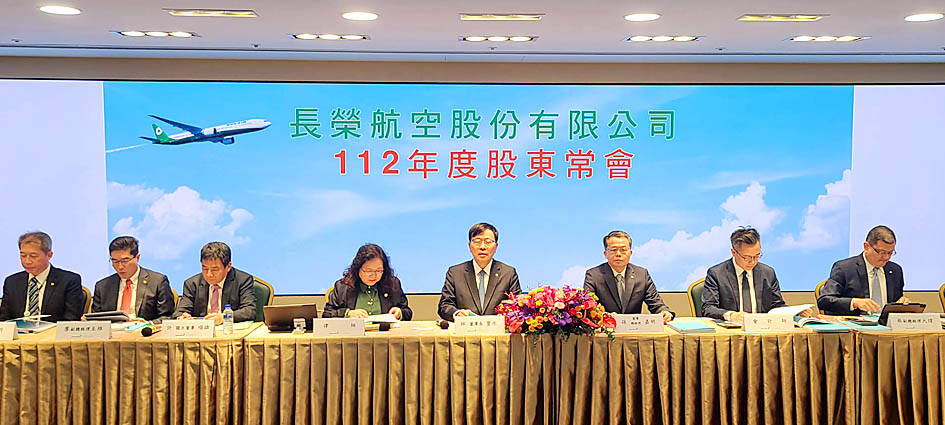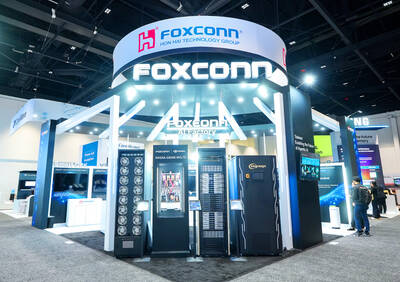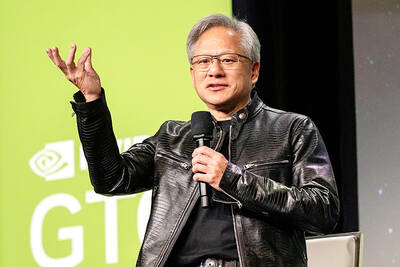EVA Airways Corp (長榮航空) yesterday said its average ticket prices rose by a more-than-expected 50 percent in the first quarter of this year, compared with before the COVID-19 pandemic.
EVA Airways president Clay Sun (孫嘉明) attributed the increase to robust demand for long-haul flights, as well as business-class and premium-economy-class seats, as consumers embraced air travel following the easing of border controls.
Sun made the remarks during the company’s annual shareholders’ meeting.

Photo: Wang Yi-hung, Taipei Times
The number of flights operated by EVA has returned to 75 percent of pre-pandemic levels and might rise to 80 percent next quarter, the airline said.
The number of flights it operates to Europe has surpassed the pre-pandemic level, while those to the Americas and Southeast Asia are still recovering, it said.
EVA expects its revenue this quarter to grow further, after increasing 47 percent annually last quarter to NT$44.42 billion (US$1.44 billion), Sun said.
“Summer vacation will be peak season for the passenger business. We have seen strong bookings for long-haul flights from Taiwan to Europe and the US in July,” he said.
“The booking rate for flights in July has risen to 70 percent. We expect the number to climb to 90 percent in July and August,” he added.
Speaking about the cargo business, Sun said that freight rates have bottomed out.
Demand would rebound if central banks slow down their rate hikes, he said.
EVA shareholders approved a proposal to distribute a cash dividend of NT$0.8 per share.
EVA Airways chairman Steve Lin (林寶水) was re-elected as a board member and chairman, a corporate filing showed.
EVA reported net earnings of NT$4.49 billion in the first quarter, the highest of all time, or earnings per share of NT$0.84, corporate data showed.

Anna Bhobho, a 31-year-old housewife from rural Zimbabwe, was once a silent observer in her home, excluded from financial and family decisionmaking in the deeply patriarchal society. Today, she is a driver of change in her village, thanks to an electric tricycle she owns. In many parts of rural sub-Saharan Africa, women have long been excluded from mainstream economic activities such as operating public transportation. However, three-wheelers powered by green energy are reversing that trend, offering financial opportunities and a newfound sense of importance. “My husband now looks up to me to take care of a large chunk of expenses,

State-run CPC Corp, Taiwan (CPC, 台灣中油) yesterday signed a letter of intent with Alaska Gasline Development Corp (AGDC), expressing an interest to buy liquefied natural gas (LNG) and invest in the latter’s Alaska LNG project, the Ministry of Economic Affairs said in a statement. Under the agreement, CPC is to participate in the project’s upstream gas investment to secure stable energy resources for Taiwan, the ministry said. The Alaska LNG project is jointly promoted by AGDC and major developer Glenfarne Group LLC, as Alaska plans to export up to 20 million tonnes of LNG annually from 2031. It involves constructing an 1,290km

NEXT GENERATION: The company also showcased automated machines, including a nursing robot called Nurabot, which is to enter service at a Taichung hospital this year Hon Hai Precision Industry Co (鴻海精密) expects server revenue to exceed its iPhone revenue within two years, with the possibility of achieving this goal as early as this year, chairman Young Liu (劉揚偉) said on Tuesday at Nvidia Corp’s annual technology conference in San Jose, California. AI would be the primary focus this year for the company, also known as Foxconn Technology Group (富士康科技集團), as rapidly advancing AI applications are driving up demand for AI servers, Liu said. The production and shipment of Nvidia’s GB200 chips and the anticipated launch of GB300 chips in the second half of the year would propel

‘MAKE OR BREAK’: Nvidia shares remain down more than 9 percent, but investors are hoping CEO Jensen Huang’s speech can stave off fears that the sales boom is peaking Shares in Nvidia Corp’s Taiwanese suppliers mostly closed higher yesterday on hopes that the US artificial intelligence (AI) chip designer would showcase next-generation technologies at its annual AI conference slated to open later in the day. The GPU Technology Conference (GTC) in California is to feature developers, engineers, researchers, inventors and information technology professionals, and would focus on AI, computer graphics, data science, machine learning and autonomous machines. The event comes at a make-or-break moment for the firm, as it heads into the next few quarters, with Nvidia CEO Jensen Huang’s (黃仁勳) keynote speech today seen as having the ability to